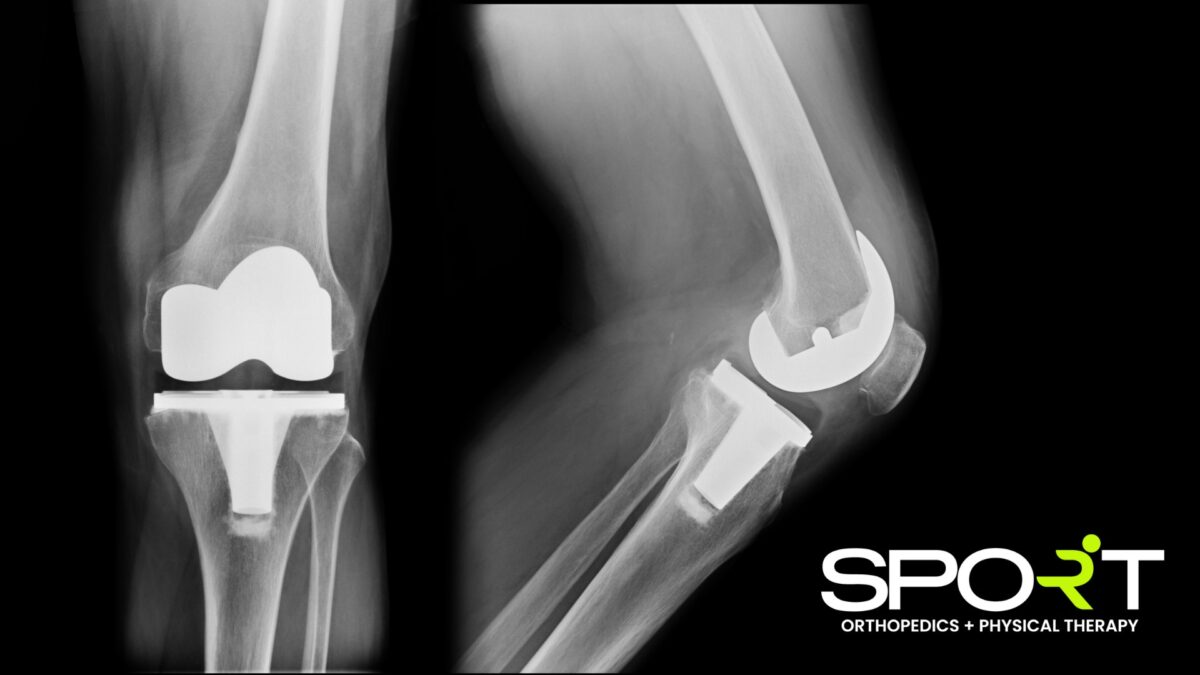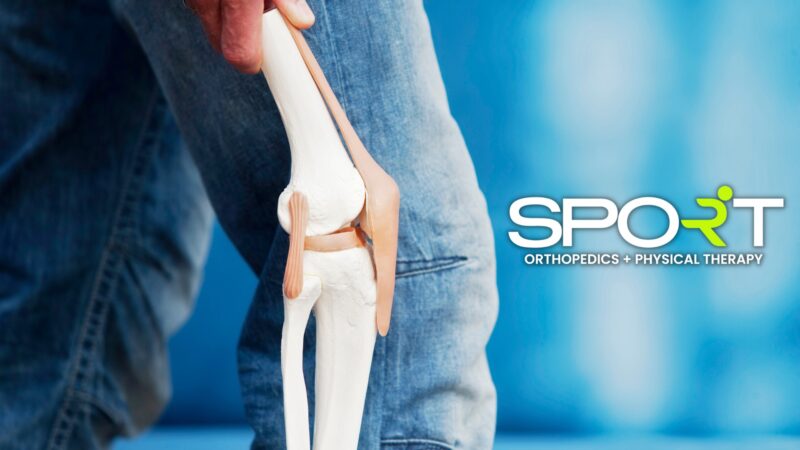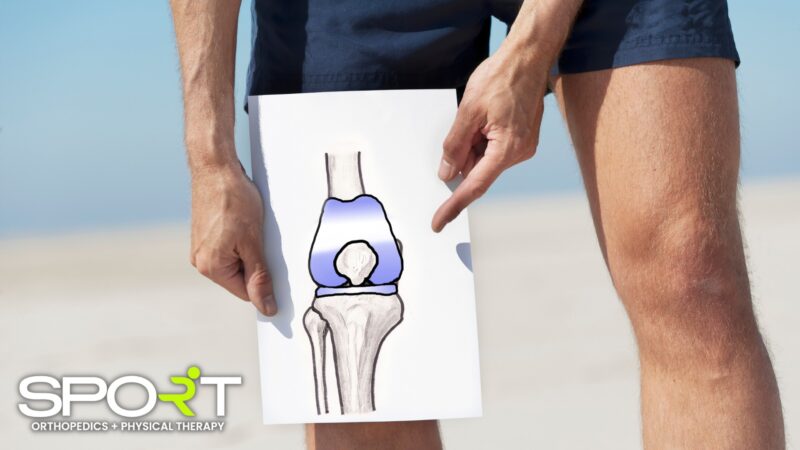Total Knee Replacement Surgery in Dallas, Plano, Frisco, and Wylie
What to Expect from Total Knee Replacement Surgery
What Is Total Knee Replacement Surgery?
Total knee replacement surgery, also known as knee arthroplasty, is a surgical procedure where an orthopedic surgeon removes the damaged cartilage and bone from the knee and replaces it with an artificial joint. Patients undergoing total knee arthroplasty have suffered severe damage to their knee and surrounding areas that a partial knee replacement and other alternative medications cannot fix.
Millions of patients undergo a total knee replacement every year. In fact, it’s one of the most common procedures our orthopedic surgeons perform. If you have knee pain caused by osteoarthritis or have suffered an injury that has damaged your knee, you might be a good candidate for a total knee replacement.
If you’re considering a total knee replacement, schedule an appointment with SPORT Orthopedics + Physical Therapy by calling 469-200-2832.
Total vs Partial Knee Replacement Surgery
A partial knee replacement only replaces the area of the knee joint that is affected. A partial knee replacement can either replace the medial area (inside the knee), the lateral area (outside the knee), or the patellofemoral area (the front of the knee). A total knee replacement replaces the entire knee joint with an artificial one.
Total Knee Replacement vs Knee Arthroscopy
A knee arthroscopy is a less invasive procedure in comparison to a total knee replacement. During knee arthroscopy, only two small incisions are made at the front of the knee, with enough room for the surgeon to remove the torn cartilage and/or fragments. With this procedure, the surgeon is able to save the natural knee joint, whereas, during a total knee replacement, the knee joint is completely replaced with an artificial knee joint.

When Is Total Knee Replacement Surgery Recommended?

Patients undergoing total knee replacement usually suffer from knee pain caused by osteoarthritis and have noticed a decrease in their mobility along with chronic pain. Osteoarthritis is a degenerative joint disease and is the most common type of arthritis that causes the knee joint cartilage to break down. Other candidates for total knee replacement might suffer from other forms of knee arthritis, like rheumatoid arthritis, or arthritis caused by a knee injury. When the knee joint affects a person’s everyday life, it might be time to consult a doctor about total knee replacement surgery.
How Do I Know if I Need a Total Knee Replacement?
If you’re suffering from chronic knee pain and have exhausted all medical treatments to improve your knee motion and pain, it might be time for a total knee replacement. Living with knee pain can affect your life in many ways.
Not only does it make walking difficult and performing everyday activities, but it can also take the joy out of things you used to love. Maybe you used to play golf or play with your grandkids, but the pain keeps you from that now. If you’re ready for knee pain relief, it’s time to talk to your doctor about knee joint replacement.
Signs That You May Need a Knee Replacement
You might benefit from total knee replacement surgery if you’re suffering from any of the following:
- Severe pain in the knee that is limiting everyday activities like walking or climbing stairs. Due to the pain, you may have started to use a walker or cane to help you get around.
- Knee pain that continues even while you’re resting or sleeping.
- Knee inflammation and swelling that does not get better with rest or medications
- Deformity of the knee
- Pain that continues despite trying alternative treatments like inflammatory medications, knee gel injections, physical therapy, and more
Alternatives to a Total Knee Arthroplasty

Before undergoing knee replacement surgery, some alternatives can help relieve knee pain. You can discuss the options available with one of SPORT’s doctors to see if the alternative methods below can relieve pain in your knee so that you can hold off on a total knee replacement.
Nonsurgical Treatments
If you want to avoid going under the knife to relieve your pain, nonsurgical options are available. When a person is dealing with pain in their knee, pursuing these alternatives can prolong their time before the procedure. Knee replacement surgery alternatives include the following.
- Knee braces can provide the knee with stability and reduce pain and swelling while strengthening the knee. The knee brace applies pressure to both sides of the knee joint, which helps to realign the joint.
- Injections and infusions: Medications like corticosteroids can be directly injected into the knee to relieve pain and reduce inflammation. Infusions are given either intravenously or directly into the muscle to reduce inflammation.
- Lifestyle modifications like weight loss and avoiding activities like running can offer pain relief.
- Pain medications, like acetaminophen and ibuprofen, can be over-the-counter or prescription medications like antirheumatic drugs. Another pain medication option is topical analgesics, like muscle rubs.
- Physical therapy: Participating in rehabilitative medicine and exercise programs can help stretch the knee and strengthen muscles to improve support and flexibility. Discussing your knee pain with a Dallas physical therapist will help them to tailor your exercises to suit your specific needs.
Knee Arthroscopy
Knee arthroscopy is a minimally invasive surgical procedure. During knee arthroscopy, the surgeon will make two small incisions to either repair the cartilage or meniscus tear or remove the bone and cartilage fragments.
Partial Knee Replacement
Your surgeon might determine that you are a candidate for a partial knee replacement if the cause of your pain is only in a particular area of the knee. During this procedure, the surgeon will remove the damaged tissue and bone around the affected area of the knee joint and replace it with an implant.
Osteotomy
An osteotomy is more common in younger patients with damage to one side of the knee. During this procedure, the surgeon cuts the thigh bone or shin bone and shifts the weight away from the arthritic area of the knee.
What Conditions Can a Total Knee Replacement Treat?

Anyone suffering from medical conditions that cause the cartilage of the knee joint to break down can be a candidate for knee replacements. These medical conditions include:
- Knee osteoarthritis: This degenerative joint disease is the most common reason a person might need a knee replacement. Typically osteoarthritis develops over time, either as you age or from an injury.
- Any knee damage caused by other types of arthritis, such as rheumatoid arthritis.
- Problems stemming from a knee joint that has not formed properly, also called a knee deformity.
How to Prepare for a Total Knee Replacement
Before your knee replacement surgery, there are several steps that you can take to prepare and help make your recovery easier.
- Quit smoking: Research shows that patients that quit smoking before surgery have fewer complications afterward. Smoking can cause bones, tissue, and skin to not heal after a medical procedure, making it harder for your body to fight off an infection.
- Dental care: Schedule any dental procedures six weeks before surgery or wait three months after surgery. Patients that have dental procedures too close to their surgery can run the risk of infections due to the possibility of germs entering the mouth and moving into the bloodstream.
- Adjust medications: Avoid taking blood thinners leading up to your surgery. Your surgeon will tell you what medications you can and cannot take before the procedure.
- Avoid alcohol: Consuming any alcohol before surgery can increase bleeding and dehydration.
- Find a caretaker: Before surgery, you’ll want to find someone that can drive you home from the hospital and sit with you the days following.
- Prepare your home: You may want to install a toilet seat lift and shower chair before surgery to make performing those tasks more manageable. It’s also recommended to rearrange your home to have a clear path leading to important areas like the bathroom, kitchen, and bedroom. Designate either a chair or bed where you will be spending most of your recovery and have all your most important items within reach, like medications, phone chargers, etc. Stocking your fridge and freezer with ready-made meals can also relieve the stress following surgery.
What Happens During a Total Knee Replacement?
Before surgery, you’ll be admitted to the hospital. A total knee replacement typically requires a brief hospital stay following the procedure. Then, you will be evaluated by an anesthesiologist to determine the type of anesthesia that will work best for you.
A total knee arthroplasty usually lasts between one to two hours. During the procedure, your surgeon will remove all the damaged cartilage and bone from the surface of your knee joint. The areas the surgeon will replace are the end of the shin bone, the end of the thigh bone, and the back of the kneecap. Once all the damaged cartilage and bone have been removed, the surgeon will attach the knee replacement implant to your bone.
What Happens After a Total Knee Replacement?

After your total knee replacement, you will remain in the hospital for observation. Your hospital stay will usually last several days unless your doctor decides otherwise. Following your surgery, a physical therapist will visit you and create an exercise program. It’s important to move your new knee joint as soon as possible.
If you cannot get up and walk, they may bring in a continuous passive-motion machine to start physical therapy. This machine will move your new knee joint while you remain in bed. Your pain will be monitored while participating in your physical therapy exercises.
Depending on the doctor’s recommendations, you will either be discharged and headed home or to a rehabilitation facility. It’s important to continue physical therapy exercises once you’ve been released to strengthen your muscles and improve your range of motion.
Your doctor will provide specific instructions to care for your surgical site and bathing. The staples or stitches will be removed during your follow-up appointment. To keep swelling down, keep your leg elevated or apply ice. If pain or discomfort persists, only take the medication your doctor prescribed since some pain relievers like aspirin can increase bleeding.
Potential Complications of Total Knee Replacements
Like any surgical procedure, there is always a risk of complications. While the risks are relatively low with a total knee replacement, you could still have some problems post-surgery.
- Bleeding
- Blood clots
- Infection
- Heart attack or stroke
- Nerve damage
- Scarring that can limit your mobility
- Continued pain or stiffness
It’s important to understand the warning signs of a blood clot. Blood clots can be severe and even life-threatening. If you start to notice any increasing pain in your calf, tenderness or redness around your knee, or new or increased swelling in your calf, ankle, and foot, notify your doctor immediately. If you notice sudden shortness of breath and chest pain, the clot could have potentially traveled to your lungs, creating a pulmonary embolism.
Following doctor’s orders regarding cleaning your wound is important to avoid infections. This is why it’s recommended to have dental work before your surgery to lower your risk of infections that can come from the dentist. You’ll want to notify your doctor immediately if you start to experience persistent fever, chills, drainage from the knee, increasing pain during activities and rest, and increasing redness, tenderness, or swelling around the knee.
Benefits of a Total Knee Arthroplasty
There are many benefits of having total knee arthroplasty. In fact, most patients that undergo total knee replacement surgery can return to their usual way of life. After your surgery, you should be able to return to enjoying the activities your pain kept you from. While you may experience some pain, overall, you should be pain-free and able to participate in low-impact activities like golf, walking, swimming, or biking. Returning to an active lifestyle following your surgery will also benefit you in the long run, as it can help prevent cardiovascular disease, diabetes, obesity, osteoporosis, and other health conditions.
How Effective Is a Total Knee Replacement?
A total knee replacement is a highly effective procedure that improves the quality of life for those suffering from knee arthritis. According to the American Academy of Orthopedic Surgeons (AAOS), 90 percent of knee replacement patients notice a significant decrease in pain. In fact, the AAOS also notes that over 90 percent of knee replacement implants are still functional after 15 years, and 82 percent are still functioning after 25 years.
Is a Total Knee Arthroplasty a Major Surgery?
Total knee arthroplasty is considered a major surgery and is the last resort when other treatments, like pain medication, physical therapy, and bracing, do not relieve knee pain. It is considered a major surgery because it involves the opening of the body, major tissue trauma, a high risk of infection, and a prolonged recovery period. Major operations will usually leave a scar.
How Painful Is a Total Knee Replacement?
Determining the pain level of total knee replacements will vary depending on the patient. Typically, patients experience pain after the initial knee arthroplasty, but it should not be severe. Patients usually don’t have more pain than they suffered before their surgery.
The most pain people might experience will be the days immediately following, but this is normal, which is why your knee surgeon has prescribed you pain medications. If your pain medicine is not alleviating the pain, notify your doctor immediately. This could indicate that you have developed a blood clot or infection.
What Is the Recovery Time for a Total Knee Replacement?
Following your surgery, you will spend between one to three days in the hospital, depending on how you and your knee are doing. Once you’ve been discharged, recovery from total knee arthroplasty can last up to three months. Usually, patients should be able to drive at the four to six weeks point and return to work between six to eight weeks.
It’s important to follow all instructions given to you by doctors, nurses, and physical therapists. Any deviation from these instructions can result in prolonged recovery or injury.
Will I Need Physical Therapy After a Total Knee Replacement?
Physical therapy following a total knee replacement is part of the recovery. It plays an essential role in the recovery process and helps strengthen the new joint and improve the range of motion. Following surgery, it’s important to start moving as soon as possible. The benefits of physical therapy after total knee arthroplasty are:
- Strengthening the muscles around your new joint
- Improving circulation, which promotes healing
- Reducing pain and swelling
- Speeding up your return to everyday activities
- Regaining normal movement and function
The time you must continue therapy following your surgery will vary from patient to patient.
How to Care for Your Knee Replacement

After your total knee replacement, you must carefully perform activities like getting dressed and bathing while your knee heals.
- Getting dressed
- Don’t put on pants while standing up. Use a chair or bed to position yourself so you’re more stable.
- Use devices like a reacher, long-handled shoe horn, elastic shoe laces, etc., that can help make getting dressed easier.
- Put pants on the leg that you had surgery on first.
- While undressing, remove clothing from the surgical side last.
- Sitting
- Avoid sitting in the same position for more than 45 minutes to an hour at a time.
- Keep feet and knees pointed straight ahead.
- Sit in a firm chair with a straight back and armrests. Sofas, stools, soft chairs, and rocking chairs are too low.
- When getting up from a chair, slide to the edge and use the armrests to get up.
- Bathing and showering
- Standing in the shower is ok as long as you are able. Using a tub seat or shower seat is also recommended.
- Put a rubber mat in the tub or shower and dry the bathroom floors.
- Do not bend over to pick up anything in the shower.
- Use a long-handled shower sponge for washing, or have someone help you bathe.
- Have someone adjust the shower knobs for you if they’re difficult to reach.
- Do not sit on the bottom of a bathtub, as it will be too difficult to stand back up.
- If necessary, use an elevated toilet seat to help keep your knees lower than your hips.
- Using stairs
- When going up, use the leg that did not have surgery first.
- When going down, use the leg that did have surgery first.
- You may need to climb stairs one step at a time initially.
- Hold on to the banister or railing for support.
- Avoid long flights of stairs for the first two months.
- Lying down
- Lie flat on your back.
- Do not place a pad or pillow under your knee while lying down. Your knee must be kept straight.
- If you need to elevate your knee, keep it straight.
- Getting in and riding in cars
- Get into a vehicle at street level. Do not use a curb or step.
- Move the seat back as much as possible.
- Avoid car seats that sit too low. Use a pillow if necessary.
- During long car rides, stop and walk around every 45 minutes to an hour.
- Perform simple exercises like ankle pumps while riding to lower your risk of blood clots.
- Take pain medication before your ride home from the hospital.
- Turn your body as you get out of the car and use assistance.
- Scoot and lean forward.
- Getting dressed
- Walking
- Use crutches or a walker until you’re given the OK to stop.
- Don’t exceed the recommended amount of weight that you put on your knee.
- Keep your knees as straight as possible while standing.
- Take small steps when turning.
- Wear non-skid shoes.
- Walk slowly if the ground is wet or uneven.
- Do not wear flip flops.
Contact SPORT Orthopedics + Physical Therapy Today
If all the alternative medications and treatments have not relieved your knee pain, it might be time for a total knee replacement. At SPORT Orthopedics + Physical Therapy, you’ll receive the best care from the area’s leading knee replacement surgeon. If you’re ready to begin your healthy knee journey, schedule an appointment today by calling 469-200-2832.
We also specialize in other types of joint replacement surgeries, including the following:


